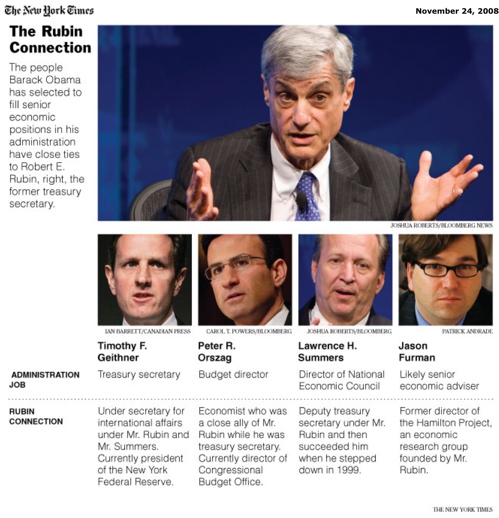The New York Times tugs on the loose threads in the Rubin story to see if it will unravel a little. Ostensibly this is a story about Rubin’s acolytes coming to power and how they’re going to have to repudiate–or transform–the basic tenets of Rubinomics. But that’s a red herring. No one would expect the endlessly pragmatic Rubin to be pushing a 15-year-old playbook:
All three advisers — whom Mr. Obama will officially name on Monday and Tuesday — have been followers of the economic formula that came to be called Rubinomics: balanced budgets, free trade and financial deregulation, a combination that was credited with fueling the prosperity of the 1990s.
But times have changed since then. On Wall Street, Mr. Rubin is facing questions about his role as director of Citigroup given the bank’s current woes. And in Washington, he and his acolytes are calling for a new formulation to address the global economic crisis that Mr. Obama will inherit — and rejecting or setting aside, for now, some of their old orthodoxies.
Having reminded readers of the sticky position Rubin is in with the government bailing out his bank as he guides the choice of the new president’s economics team. But as Chris Whalen points out in some earlier comments, the big danger is the lack of competing views, which seems like it might have been the problem at Citi. But liberal critics are more focused on getting their agenda through:
“What worries me is there is not one person in the senior group who is the outsider to this club,” said Robert Kuttner, a colleague of Mr. Bernstein’s at the liberal Economic Policy Institute who has written a book, “Obama’s Challenge,” about approaches to the economic crisis. “Where is the diversity of opinion in this economic team?” Mr. Kuttner asked.
Yet even Mr. Kuttner has warmed to some he calls Rubinistas. He praises Mr. Geithner for not hailing from a Wall Street investment bank and for being “among the toughest on the need to re-regulate” the financial industry from his perch at the New York Federal Reserve.
Mr. Kuttner calls Mr. Summers brilliant and notes that he has been out front in proposing big stimulus spending. But he disapprovingly noted that in recent meetings of economists advising Congressional Democrats, Mr. Summers has argued against restricting banks’ ability to issue dividends to stockholders as a condition of receiving federal bailout money.
Let’s see what the reaction to Citigroup and the “bad bank” solution when it debuts later today. The good news for Obama and Rubin: the Republican party is too weak to squeeze a yelp out of Rubin.
Source:
Rubinomics Recalculated
JACKIE CALMES
New York Times, November 24, 2008
http://www.nytimes.com/2008/11/24/us/politics/24rubin.html?ref=business


